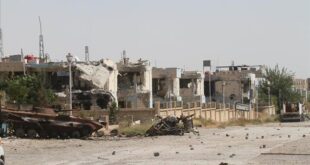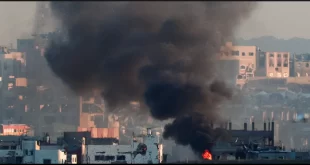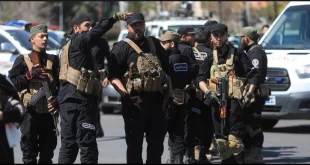
Saddam Jamal held the mother and father at gunpoint and forced them to watch as his jihadist comrade murdered their children, one by one.
The Isil commander felt no remorse for killing this Syrian family, his bodyguard said, nor did he believe he was fulfilling a God-given creed: for him being a member of the extremist group was a matter of business, not religion.
“Starting with a thirteen-year-old boy, they lined up the sons according to their height and beheaded them in that order,” said the bodyguard, who called himself Abu Abdullah and who has now defected.
“Afterwards, they hung the boys’ heads on the door of the school the family had been hiding in.”
Before joining Isil, Jamal had been a drug dealer, then a commander in the western-backed Free Syrian Army, claiming contacts in the CIA.
That might seem an incongruous life story for a religious ideologue, but Abu Abdullah’s interview with The Telegraph was further evidence that the military leadership of the Islamic State of Iraq and the Levant is less religiously “pure” than its propaganda suggests.
The US-led coalition is now making a concerted effort to destroy Isil’s leadership.
Up to now, hampered by a lack of good intelligence, its air attacks have been opportunistic, or in support of ground operations by Iraqi or Kurdish troops.
At the weekend, the US hit “leadership” targets at least twice – a convoy near Mosul on Friday and a meeting at the town of al-Qaim on Saturday – among 18 strikes on Iraq.
A Pentagon spokesman said it was still unclear whether, as reported, Isil’s leader Abu Bakr al-Baghdadi had been wounded, but his adviser, Abu Suja, was killed.

Abu Suja, left, and Abu Bakr al-Baghdadi (AP)
On Monday, the Ministry of Defence confirmed an RAF Reaper drone had also taken part in attacks in Iraq for the first time, firing a Hellfire missile at fighters laying homemade bombs north of Baghdad.
Analysts say that the loss of “Caliph” Ibrahim, as his followers call Baghdadi, would be a blow to morale, but that Isil’s structure would survive. He has delegated authority to an inner circle of jihadi ideologue “ministers”.
But much of the fighting is led by warriors from a variety of backgrounds, including Saddam Hussein’s dismantled army. Some have an even shadier past.
Saddam Jamal was originally a drug dealer, Abu Abdullah, told The Telegraph. Then, when the war began, he made money from its financiers, eventually becoming a top commander in the Western-backed Free Syrian Army.
After his defection to Isil, Abu Abdullah said, he followed the example of other Isil “emirs” or leaders, who reigned over his territory with violence, extortion and hypocrisy.
“They kidnap and carry out assassinations,” he said. “They think nothing of bringing down a whole building with women and children inside, just to kill one person.
“A lot of their local and foreign fighters smoke but if they ever catch a civilian doing the same they lock him up, whip him and forced into community service. Why the double standards?”
The war in opposition-held Syria is characterised by shifting alliances, with rebels joining and defecting from Islamist and secular armed groups according to which has the better financial backing.
In this respect Isil was little different, Abu Abdullah said. Jamal, who is now second in command for military affairs in the whole of eastern Syria behind the notorious Chechen jihadist Abu Omar al-Shishani, was until last year a top leader in the Supreme Military Council, a body coordinating rebel groups receiving money and weapons from western allies with CIA support.
But the group he led, Liwa Allah Akbar, was a branch of Ahfad al-Rasoul, a western-backed group that split with Isil last year. Isil stormed his base in the town of al-Bukamal in Deir al-Zour province, near the Iraqi border, destroying his group and sending him fleeing.
“Isil blew up Jamal’s house killing one of his brothers. They kidnapped another brother and killed him too. After that Jamal disappeared,” said Abu Abdullah.
Then, in November last year Jamal reappeared in a video in which he pledged allegiance to Isil and dubbed the rebels from the FSA “apostates”.
By April, Jamal, now sporting a long beard, was himself leading a fresh Isil attack on the still rebellious al-Bukamal, capturing it and declaring it part of the “Islamic State”.
Over the following months, he grew all-powerful in the area, coming into his own when a local tribe, the Shaitat, rose up against Isil, but were savagely repressed. A total of 700 Shaitat men and boys were killed in retribution.
The children whose beheading Jamal oversaw were members of the tribe.
“It would take days to recount to you the violence I witnessed,” Abu Abdullah said.
The killing of the children was not even the incident which horrified him most. He recalled Abu Abdullah al-Qahtani, the “emir” in the nearby town of Shehil, forcing his eight-year-old son to slit the throat of a prisoner:
“He held his son’s hand with a knife in it and made him cut the head of an FSA fighter accused of organising attacks on Isil,” he said.
When he could no longer face the brutal behaviour of his boss, Abu Abdullah, along with two other groups of bodyguards, decided to leave.
Four were killed after their intentions were revealed.
Some foreign fighters too, lured by promises of “holy jihad”, wanted to leave once they saw the true behaviour of the group, but were unable to, Abu Abdullah said.
“There are of course some who really believe that killing and whipping is the correct way to spread Islam,” he said.
“But for Jamal, he doesn’t really care if the mission spreads Islam. All he cares about is becoming more powerful. Now, if a stronger organisation emerges, he will join it. And there are lots of men in Isil just like him.”
 Syria Support Movement solidarity with the Syrian people
Syria Support Movement solidarity with the Syrian people




